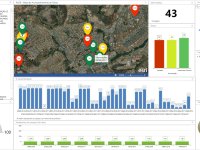With the complex service system, it is difficult to help young people with numerous problems. The MY LIFE working method is a co-created, human service integration for young adults, complete with case management, a survey assessment, and an ePlatform.
Innovation Tag: Data
In order to support the operation of certified cash registers, the Financial Administration (FA) launched a crowd-sourcing campaign in 2016 for the purpose of motivating consumers to receive an invoice, take it, check whether it is correct and send it to the FA. This way, every citizen was able to contribute crack down on invoice fraud and to reduce the shadow economy (which is the part of an economy involving goods and services which are paid for in cash, and therefore not declared for tax.)
MyInfo allows Singapore citizens to provide personal data, only once (if not already made available), instead of doing so for every government digital service. It aims to increase convenience and save time in digital transactions, while reducing cost by reducing hardcopy document verification.
The Environmental Sanitation Company of the Federal District of Brazil uses of spatial intelligence to reduce water consumption, increase revenues and optimize process.
The Price Bank enables public procurement parties to have points of reference for price quotes for particular products, as it is a database of electronic invoices issues in Brazil. Participants narrow their search via descriptors and filters to find the right quote.
The purpose of this app is to alert citizens, especially the ones with health problems, about the current and near-future conditions at their current location. This app is linked to complex algorithms developed by scientists at Masdar Institute using real-time satellite data and weather forecasting models. This app issue warnings on air quality and dust concentration to the public and especially to asthma-effected population. Real-time data is updated each 15 min.
Forest fires affect many parts of Southeast Asia, resulting in extensive environmental destruction, health problems, school closures and transport cancellations. Haze Gazer is a web‐based decision support system for disaster management authorities which harnesses multiple sources of data to provide insights on haze disaster dynamics.
The Republic of Estonia is the first country to offer e-Residency— a transnational digital identity available to everyone in the world interested in managing a location-independent business. E-Residency enables secure and convenient digital services that facilitate credibility and trust online.
The Data Science Campus vision is data science for public good. Our goals are to explore new data sources, perform cutting-edge research with new-generation tools and technology, and build data science capability across government. This will enable the UK to grasp the transformational opportunities offered by data science, inform our understanding of the UK, and support better decision-making.
In the labour and social services administration, the Trelleborg municipality uses the help of a case handler program to automate certain parts of processes that concern for example processing of financial assistance. The result is less administration and more time for core services.

